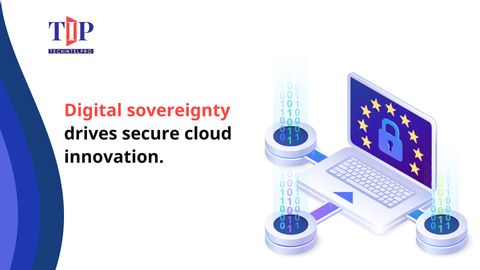Digital sovereignty is becoming a top priority for European businesses and governments. With data privacy regulations tightening and cloud adoption accelerating, organizations are seeking more control over where their data is stored and how it is managed. In this context, Amazon Web Services (AWS) and SAP have announced an expanded collaboration aimed at advancing digital sovereignty across Europe.
The partnership combines SAP’s enterprise software expertise with AWS’s cloud infrastructure capabilities. It is designed to offer secure, compliant, and scalable solutions for organizations operating in highly regulated industries. This collaboration reflects the growing need for cloud services that align with local regulations while enabling digital innovation.
A Strong Investment in European Cloud Infrastructure
At the core of the partnership is the AWS European Sovereign Cloud. This new cloud region is specifically designed for Europe and operates independently of AWS’s existing global infrastructure. Amazon plans to invest €7.8 billion in the initiative, with the first region scheduled to launch in Brandenburg, Germany, by the end of 2025.
The AWS European Sovereign Cloud is designed to meet the rising demand for data residency, operational autonomy, and resilience. It allows organizations to maintain control over their data within European borders while leveraging modern cloud technologies. For businesses in sectors such as finance, healthcare, and public services, this capability is critical for regulatory compliance and operational security.
SAP’s Sovereign Cloud Capabilities
SAP will integrate its Sovereign Cloud solutions into the AWS European Sovereign Cloud. This integration provides customers with access to security-hardened cloud solutions designed for regulated industries and government agencies. SAP’s offerings, including SAP Business Technology Platform and SAP Cloud ERP, will run on this infrastructure. This enables organizations to manage critical business processes safely and efficiently.
Key benefits of this integration include:
- Enhanced Security: Solutions are designed to protect sensitive data in highly regulated environments.
- Regulatory Compliance: Organizations can meet local legal and industry requirements.
- Operational Continuity: Critical business processes remain stable and reliable.
- Scalability: Enterprises can expand operations without sacrificing performance.
- Innovation with Confidence: Customers can adopt new technologies while staying compliant.
By combining SAP applications with AWS infrastructure, organizations gain the ability to innovate, scale, and operate securely. This setup ensures that businesses can meet European regulations without compromising performance or business growth.
Also Read: AWS and SAP SE Expand Sovereign Cloud Partnership in Europe
Meeting the Needs of Regulated Industries
Financial institutions, healthcare providers, and government agencies face significant regulatory pressures. Data privacy laws such as GDPR require strict control over personal and sensitive data. Many organizations struggle with balancing regulatory compliance and digital transformation.
The AWS-SAP collaboration addresses these challenges directly. Banks can deploy secure cloud solutions while maintaining control over financial data. Healthcare providers can manage patient information safely and comply with privacy rules. Governments can use the sovereign cloud to protect citizen data while deploying digital services efficiently. These capabilities reduce risks and support operational agility.
Driving Innovation with Compliance
One of the key benefits of this partnership is the ability to innovate without regulatory compromise. Organizations can experiment with AI, machine learning, and advanced analytics while keeping data within European borders. SAP applications running on AWS infrastructure enable seamless integration of business processes and analytics tools.
For example, a bank could use cloud analytics to detect fraud in real-time while ensuring sensitive data remains in Germany. A healthcare provider could deploy AI-powered diagnostics securely within the sovereign cloud. These scenarios demonstrate how technology and compliance can coexist effectively.
Economic and Strategic Impacts
The partnership is expected to have broad economic and strategic effects. European businesses gain access to modern cloud services while complying with local regulations. This could accelerate digital transformation and increase operational efficiency across multiple sectors.
The investment also strengthens Europe’s position in the global technology landscape. By creating a cloud infrastructure that meets European standards, AWS and SAP are supporting local innovation. Companies can develop solutions confidently, knowing they are aligned with regulatory requirements. The sovereign cloud can also attract new enterprises to adopt cloud solutions, boosting the overall technology ecosystem.
A Step Toward Full Digital Sovereignty
Digital sovereignty is not just about technology. It is about control, trust, and independence. Organizations want assurance that their data is protected and compliant with regional laws. The AWS European Sovereign Cloud and SAP’s integration help achieve this goal.
With independent infrastructure and robust software capabilities, businesses can operate securely and efficiently. They can innovate at speed while respecting regulations. This combination strengthens Europe’s digital ecosystem and reduces reliance on non-European cloud infrastructure.
Future Outlook
The AWS-SAP collaboration sets a strong foundation for the future of digital sovereignty in Europe. Organizations across finance, healthcare, government, and other sectors can expect increased adoption of secure cloud solutions. Over time, more SAP applications and services are likely to become available on the AWS European Sovereign Cloud, broadening its impact.
As cloud adoption grows, businesses will increasingly demand sovereignty, security, and compliance. This partnership positions AWS and SAP as key enablers of this transformation. European organizations can pursue innovation without compromising on regulatory obligations, operational control, or data protection.
Conclusion
The expanded collaboration between AWS and SAP represents a major milestone in Europe’s journey toward digital sovereignty. By combining SAP’s enterprise software expertise with AWS’s sovereign cloud infrastructure, organizations can meet regulatory requirements, innovate securely, and scale efficiently. The launch of the AWS European Sovereign Cloud in Brandenburg, Germany, is expected to accelerate adoption across multiple sectors. Banks, healthcare providers, and government agencies can benefit from secure, compliant, and high-performing cloud solutions.
This partnership is a clear example of how technology companies can support regional autonomy while driving digital innovation. For European organizations, it offers a path to transform operations and maintain control over their digital future.


